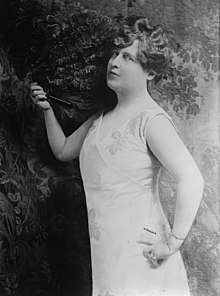Florence Foster Jenkins
| Florence Foster Jenkins | |
|---|---|
 |
|
| Born |
Narcissa Florence Foster July 19, 1868 Wilkes-Barre, Pennsylvania |
| Died | November 26, 1944 (aged 76) Manhattan, New York City |
| Occupation | Amateur singer, socialite |
| Years active | 1912–44 |
| Spouse(s) | Frank Thornton Jenkins (1885–1902?, separated 1886) |
| Partner(s) | St. Clair Bayfield (1909–44; her death) |
Florence Foster Jenkins (born Narcissa Florence Foster; July 19, 1868 – November 26, 1944) was an American socialite and amateur soprano who was known and mocked for her flamboyant performance costumes and notably poor singing ability. The historian Stephen Pile ranked her "the world's worst opera singer". "No one, before or since," he wrote, "has succeeded in liberating themselves quite so completely from the shackles of musical notation."
Despite (or perhaps because of) her technical incompetence, she became a prominent musical cult figure in New York City during the 1920s, 1930s, and 1940s. Cole Porter, Gian Carlo Menotti, Lily Pons, Sir Thomas Beecham, and other celebrities were fans.Enrico Caruso is said to have "regarded her with affection and respect". The poet William Meredith wrote that what Jenkins provided "... was never exactly an aesthetic experience, or only to the degree that an early Christian among the lions provided aesthetic experience; it was chiefly immolatory, and Madame Jenkins was always eaten, in the end.”
Narcissa Florence Foster was born July 19, 1868, in Wilkes-Barre, Pennsylvania, the daughter of Charles Dorrance Foster (1836–1909), an attorney and scion of a wealthy land-owning Pennsylvania family, and Mary Jane Hoagland Foster (1851–1930). Her one sibling, a younger sister named Lillian, died at the age of eight in 1883.
Foster said she first became aware of her lifelong passion for public performance when she was seven years old. A talented pianist, she performed in her youth at society functions as “Little Miss Foster”, and gave a recital at the White House during the administration of President Rutherford B. Hayes. After graduating from high school, she expressed a desire to study music in Europe. When her father refused to grant his permission, or the necessary funds, she eloped with Dr. Frank Thornton Jenkins (1852–1917) to Philadelphia, where they married in 1885. The following year, after learning that she had contracted syphilis from her husband, she terminated their relationship and reportedly never spoke of him again. Years later, Florence asserted that a divorce decree had been granted on March 24, 1902, although no documentation of that proceeding has ever surfaced. She retained the Jenkins surname for the remainder of her life.
...
Wikipedia
